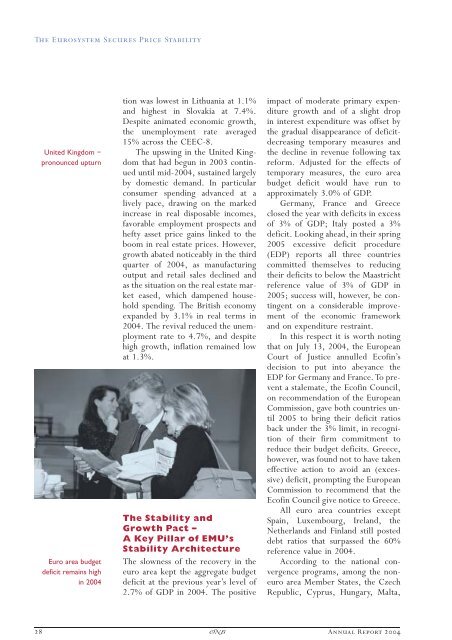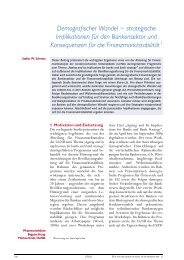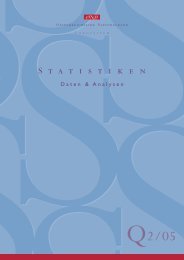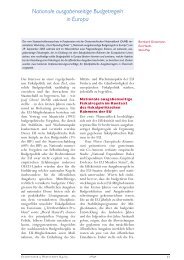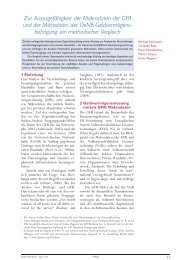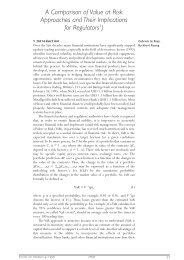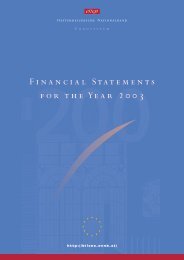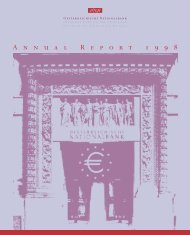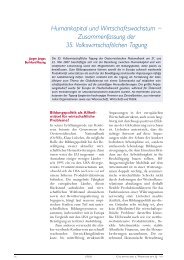You also want an ePaper? Increase the reach of your titles
YUMPU automatically turns print PDFs into web optimized ePapers that Google loves.
The Eurosystem Secures Price Stability<br />
United Kingdom —<br />
pronounced upturn<br />
Euro area budget<br />
deficit remains high<br />
in <strong>2004</strong><br />
tion was lowest in Lithuania at 1.1%<br />
and highest in Slovakia at 7.4%.<br />
Despite animated economic growth,<br />
the unemployment rate averaged<br />
15% across the CEEC-8.<br />
The upswing in the United Kingdom<br />
that had begun in 2003 continued<br />
until mid-<strong>2004</strong>, sustained largely<br />
by domestic demand. In particular<br />
consumer spending advanced at a<br />
lively pace, drawing on the marked<br />
increase in real disposable incomes,<br />
favorable employment prospects and<br />
hefty asset price gains linked to the<br />
boom in real estate prices. However,<br />
growth abated noticeably in the third<br />
quarter of <strong>2004</strong>, as manufacturing<br />
output and retail sales declined and<br />
as the situation on the real estate market<br />
eased, which dampened household<br />
spending. The British economy<br />
expanded by 3.1% in real terms in<br />
<strong>2004</strong>. The revival reduced the unemployment<br />
rate to 4.7%, and despite<br />
high growth, inflation remained low<br />
at 1.3%.<br />
The Stability and<br />
Growth Pact —<br />
A Key Pillar of EMUÕs<br />
Stability Architecture<br />
The slowness of the recovery in the<br />
euro area kept the aggregate budget<br />
deficit at the previous yearÕs level of<br />
2.7% of GDP in <strong>2004</strong>. The positive<br />
impact of moderate primary expenditure<br />
growth and of a slight drop<br />
in interest expenditure was offset by<br />
the gradual disappearance of deficitdecreasing<br />
temporary measures and<br />
the decline in revenue following tax<br />
reform. Adjusted for the effects of<br />
temporary measures, the euro area<br />
budget deficit would have run to<br />
approximately 3.0% of GDP.<br />
Germany, France and Greece<br />
closed the year with deficits in excess<br />
of 3% of GDP; Italy posted a 3%<br />
deficit. Looking ahead, in their spring<br />
2005 excessive deficit procedure<br />
(EDP) reports all three countries<br />
committed themselves to reducing<br />
their deficits to below the Maastricht<br />
reference value of 3% of GDP in<br />
2005; success will, however, be contingent<br />
on a considerable improvement<br />
of the economic framework<br />
and on expenditure restraint.<br />
In this respect it is worth noting<br />
that on July 13, <strong>2004</strong>, the European<br />
Court of Justice annulled EcofinÕs<br />
decision to put into abeyance the<br />
EDP for Germany and France. To prevent<br />
a stalemate, the Ecofin Council,<br />
on recommendation of the European<br />
Commission, gave both countries until<br />
2005 to bring their deficit ratios<br />
back under the 3% limit, in recognition<br />
of their firm commitment to<br />
reduce their budget deficits. Greece,<br />
however, was found not to have taken<br />
effective action to avoid an (excessive)<br />
deficit, prompting the European<br />
Commission to recommend that the<br />
Ecofin Council give notice to Greece.<br />
All euro area countries except<br />
Spain, Luxembourg, Ireland, the<br />
Netherlands and Finland still posted<br />
debt ratios that surpassed the 60%<br />
reference value in <strong>2004</strong>.<br />
According to the national convergence<br />
programs, among the noneuro<br />
area Member States, the Czech<br />
Republic, Cyprus, Hungary, Malta,<br />
28 ×<br />
<strong>Annual</strong> <strong>Report</strong> <strong>2004</strong>


